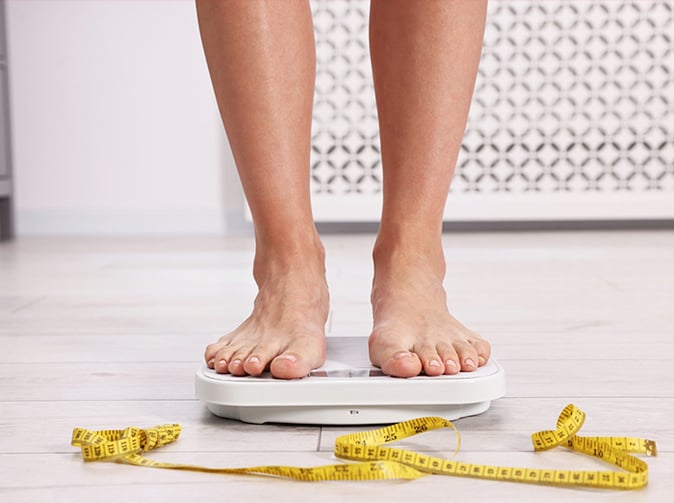As the holiday festivities wind down and a fresh new year approaches, many of us turn our attention to healthier habits. Some call it a New Year’s resolution. Whatever you call it, there is a good chance your eyes are set on making better, healthier choices in the new year. One goal that often tops the list of health improvements is weight loss. There are many benefits to losing weight, including a reduction in sleep apnea symptoms. What is sleep apnea? If you’re not yet familiar with it, sleep apnea is a condition where breathing repeatedly stops and starts during the night, often due to excess tissue in the throat putting pressure on the airways. While there are different factors involved, carrying extra pounds can make symptoms more pronounced. Losing weight eases the pressure and helps air to flow more freely, reducing symptoms like snoring, nighttime insomnia, and morning grogginess.

Are you getting ready to set weight-loss goals in January? You’ll definitely want to continue reading for encouragement and motivation if you struggle with sleep apnea. Don’t know if you have sleep apnea? Click here to order a sleep test. Diagnosing sleep apnea may be one of the healthiest decisions you ever make.
How Weight Affects Sleep Apnea
If you are above your ideal weight, it can impact sleep apnea. Extra weight in your neck can narrow your airway and increase the chances of it closing during your sleep. Extra weight in your chest and abdomen can decrease your lung volume, which makes it harder to breathe while sleeping.
How Sleep Apnea Affects Your Weight
Sleep apnea and weight have a bidirectional relationship. Not only can your weight aggravate your sleep apnea symptoms, but sleep apnea can lead to weight gain. Sleep deprivation can elevate levels of ghrelin in your system, which stimulates hunger and can lead to overeating. Sleep deprivation also leads to a decrease in leptin, a hormone responsible for helping your body know when it is full. This can make it harder to know when to stop eating.
Should You Exercise to Lose Weight?
Many people turn to exercise to lose weight. There are many benefits with this. Regular physical activity helps to burn calories, increase muscle mass, and regulate sleep patterns. Before you commit to an exercise regime, we recommend discussing it with your doctor to ensure safety, particularly if you have sensitive health challenges. If you’re relatively healthy, here are some tips:
- Begin slowly: If you haven’t exercised in a while, it is best to start off with light stretching and short walks.
- Gradually increase: Set goals and measure your progress. For example, start with an easy walk, increase to a brisk walk, and perhaps move on to jogging.
- Add to your routine: Scale up to bicycling, swimming, or aerobics.
- Track your progress: As you reach your exercise goals, track your weight.
- Be consistent: It is essential to keep at it. Slow and steady wins the race. You’ll get more benefits from consistent low-intensity exercise than one intense workout.
Exercise is a great way to shed pounds, but keep in mind that you’re also gaining muscle, so you may have a hard time tracking your progress. Also, keep in mind that exercise alone isn’t likely to solve the problem enough to fully ease your sleep apnea symptoms.
The Importance of a Balanced Diet
Exercise and food intake go hand-in-hand. They work together to help you get the best results.
- Exercise alone isn’t likely to create a caloric deficiency that is enough to result in significant weight loss. A healthy diet supports weight loss by reducing the number of calories you have to burn.
- A healthy diet is anti-inflammatory when proper foods are chosen. A reduction of inflammation in the body reduces tissue swelling in the throat and chest.
- A healthy diet is essential for metabolic health, which is often compromised in sleep apnea patients.
At this point, you may wonder how on earth you can implement exercise and healthy eating. Don’t worry. We have some tips.
Embracing a Healthy Diet
Eating right isn’t about what you “can’t” eat; it is about making choices that taste good and make you feel great. It is also about creating new habits. When you create new habits and start to feel better, it is easy to stick with it.
- Consider lowering your carbohydrate intake for fast weight loss and a fast track to feeling better. Keep in mind that carbs don’t just come from cake and cookies; they come from bread, crackers, cereal, and many other foods. Check labels for “sugar”.
- Turn to salads for nutrients and low-carb eating. But watch out for the trap of adding the things that can make your salad ineffectual, such as sugary salad dressings, croutons, and cheese. Opt for a vinaigrette, seeds, and nuts to spice things up.
- Eat healthy proteins, such as salmon, rather than bacon and processed meats.
Once you’ve met your weight loss goals, you can add things back in. For example, turn your salad into a sandwich once in a while. But always keep in mind that your weight loss success depends on a continued lifestyle of mild exercise and healthy food choices.
Don’t Give Up!
Making lifestyle changes isn’t easy—not even a little bit. Remember why you’re doing it. Sleep apnea can lead to many symptoms that can make life miserable. There are also long-term health implications that lead to medical crises and hospital stays. Mild exercise and healthy eating can help you take your life back and get the most out of it.
What is the First Step?
If you think you may have sleep apnea but you aren’t sure, your first step is to get diagnosed. You can do that by ordering a sleep test. It is simple, non-invasive, and possibly free.
Do you have questions? We’re happy to help you find the answers. Feel free to contact us at any time. Our team is here to help.

Feeling tired all the time, even after a full night’s sleep? You might be suffering from sleep apnea. Discover how an at-home sleep test can help diagnose the root cause of your fatigue—and get you back to feeling like yourself.

Spring is here—and so is the pollen. For the millions dealing with seasonal allergies, the symptoms can be more than just annoying. And if you also have sleep apnea, those stuffy nights and restless sleep can get even worse.
Let’s take a closer look at how spring allergies and sleep apnea affect each other—and what steps you can take to sleep more comfortably.




